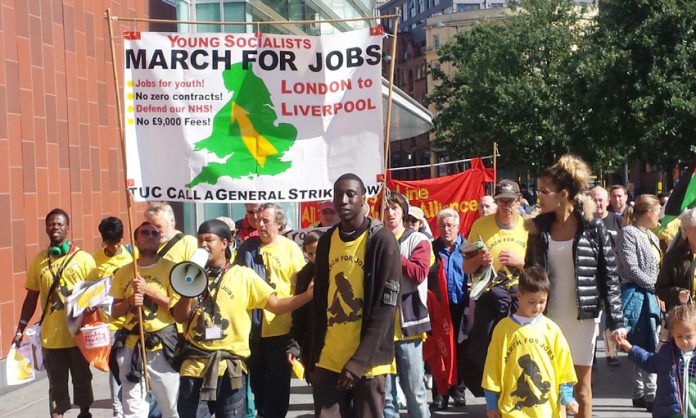
ONLY one in every forty new jobs since the onset of the crash in 2008 is full-time, with the other 39 either part-time or so-called ‘self-employed’, the TUC reported yesterday, as government figures again claimed a fall in unemployment.
TUC analysis shows that the share of full-time employee jobs was 64 per cent in 2008 and fell to 62 per cent in 2014, equivalent to a shortfall of 669,000 full-time employees.
Just one in every forty of the net jobs added to the economy between 2008 and 2014 has been a full-time employee job.
Over the same period 24 in every 40 net jobs added have been ‘self-employed’, and 26 in every 40 have been part-time.
The number of part-time employees who say they want full-time hours is twice what it was before the recession, at 1.3 million people.
The TUC said it believes that the rise in self-employment is at least in part a result of people who are unable to find employee jobs being forced into false self-employment – an exploitation of workers used by some companies to evade taxes and avoid respecting employment rights and entitlements such as holiday pay, sick pay and pensions.
TUC General Secretary Frances O’Grady said: ‘While more people are in work there are still far too few full-time employee jobs for everyone who wants one.
‘It means many working families are on substantially lower incomes as they can only find reduced hours jobs or low-paid self-employment.
‘The Chancellor has said he wants full employment, but that should mean full-time jobs for everyone who wants them.
‘At the moment the economy is still not creating enough full-time employee jobs to meet demand.’
Unemployment statistics published by the Office for National Statistics, claimed UK unemployment fell by 115,000 between July and September to 1.96 million, the 18th consecutive fall.
The number of people successfully claiming Jobseeker’s Allowance was 931,700 in October, 20,400 down on September, and the 24th consecutive monthly cut.
Paul Kenny, GMB general secretary, said: ‘Many of the new jobs are precarious and badly paid while the real value of take-home pay for the rest of the workforce is 13% below pre-recession levels.’
O’Grady said: ‘Huge concerns remain about the quality of many of the jobs being created, and as the Chancellor has found out to his cost many people are not earning enough to pay much tax, if any.’